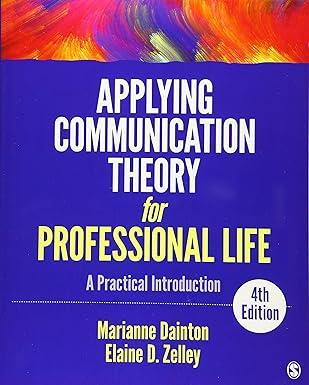Question
Please read this Case Study: Employing Social Media in Working with Athletes: A Case Study Discussing Ethical Implications for Applied Sport Psychology Consultants. Authors: MARGARIT,
Please read this Case Study: Employing Social Media in Working with Athletes: A Case Study Discussing Ethical Implications for Applied Sport Psychology Consultants.Authors:MARGARIT, Elena-Madalina TONITA, Florentina ANGELESCU, Nicolae
Source:eLearning & Software for Education; 2018, Vol. 3, p308-313, 6pDocument Abstract:This paper aims to discuss the use of social media platforms, namely Facebook and WhatsApp, as tools in supporting sport psychology interventions. The sharing of applied practice offers an opportunity to reflect both on the effectiveness of such tools and the consequent ethical implications. In terms of impact, social media could prove itself useful in fostering better communication at the cost of blurred boundaries and privacy issues. The scenarios presented focus on supporting communication within coach-athlete dyads and team environments as part of larger pre-season and competitive season interventions. The first author discusses her experience working with a university netball club within the British Universities & Colleges Sport League. Facebook was used to aid communication especially in the area of feedback, reflection and access to information from sport psychology sessions. The other scenario focuses on the work conducted with the Romanian National Handball junior female team by the second author. WhatsApp was used to enhance team cohesion and to facilitate intra-group communication. Furthermore, an example from tennis illustrates a different perspective on WhatsApp and its impact on the coach-athlete dyad. By taking into consideration the athletes', coaches' and consultant's perspective we hope to provide an alternative view on client-consultant relationships in this age and day, specifically in the sports industry. In offering this account of applied practice, we aim to emphasize the importance of ethics in informing decision-making when applied sport psychology consultants choose their tools. Finally, the paper highlights the advantages and disadvantages of using social media platforms when supporting athletes. [ABSTRACT FROM AUTHOR]Copyright of eLearning & Software for Education is the property of Carol I National Defence University and its content may not be copied or emailed to multiple sites or posted to a listserv without the copyright holder's express written permission. However, users may print, download, or email articles for individual use. This abstract may be abridged. No warranty is given about the accuracy of the copy. Users should refer to the original published version of the material for the full abstract. (Copyright applies to all Abstracts.)Author Affiliations:1BASES Accredited Sport & Exercise Scientist, Bucharest, Romania 2Romanian-American University, Faculty of Physical Education, Sport and Kinetotherapy, Expozitiei Bvd, RomaniaISSN:2066026XDOI:10.12753/2066-026X-18-187
Writean informational blog, addressing the following:
- Provide an analysis of the legal and ethical standards presented in the cases.
- Explain your position on the author's point of view.
- Explain how the ethical standards apply to these case studies. How would you address or resolve them?
- Provide a rationale of the responsibility of psychology in your resolutions.
Step by Step Solution
There are 3 Steps involved in it
Step: 1

Get Instant Access to Expert-Tailored Solutions
See step-by-step solutions with expert insights and AI powered tools for academic success
Step: 2

Step: 3

Ace Your Homework with AI
Get the answers you need in no time with our AI-driven, step-by-step assistance
Get Started


